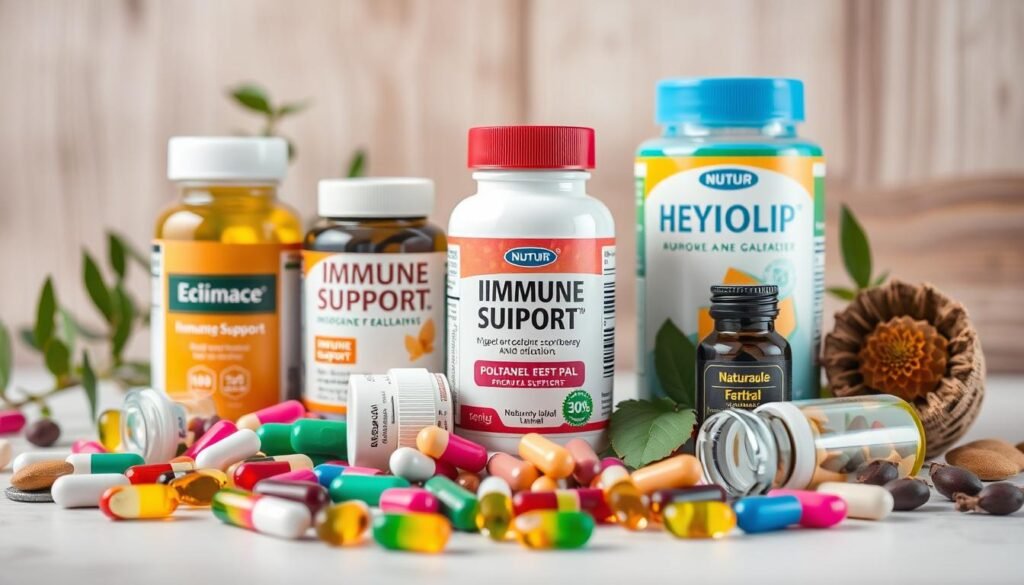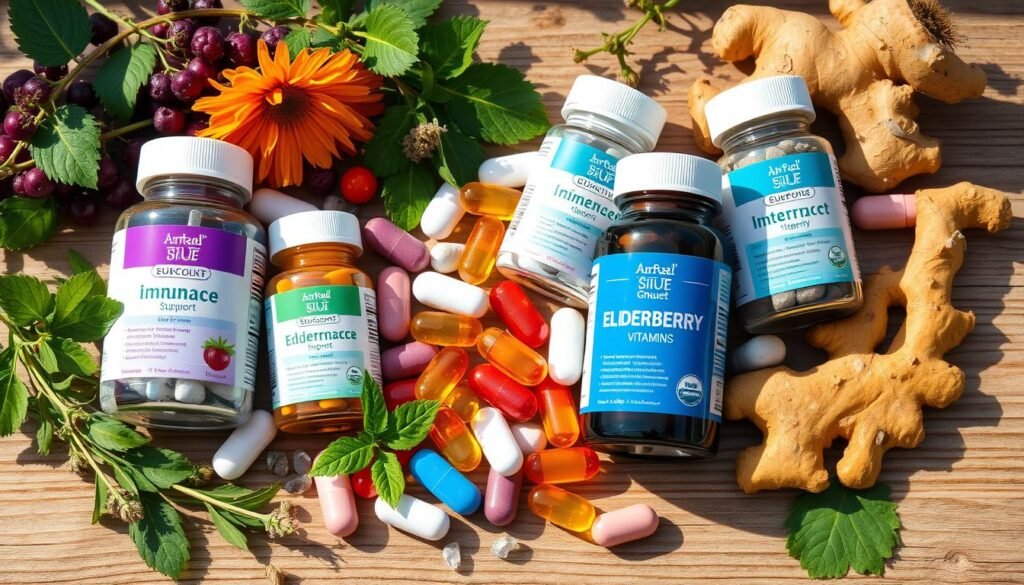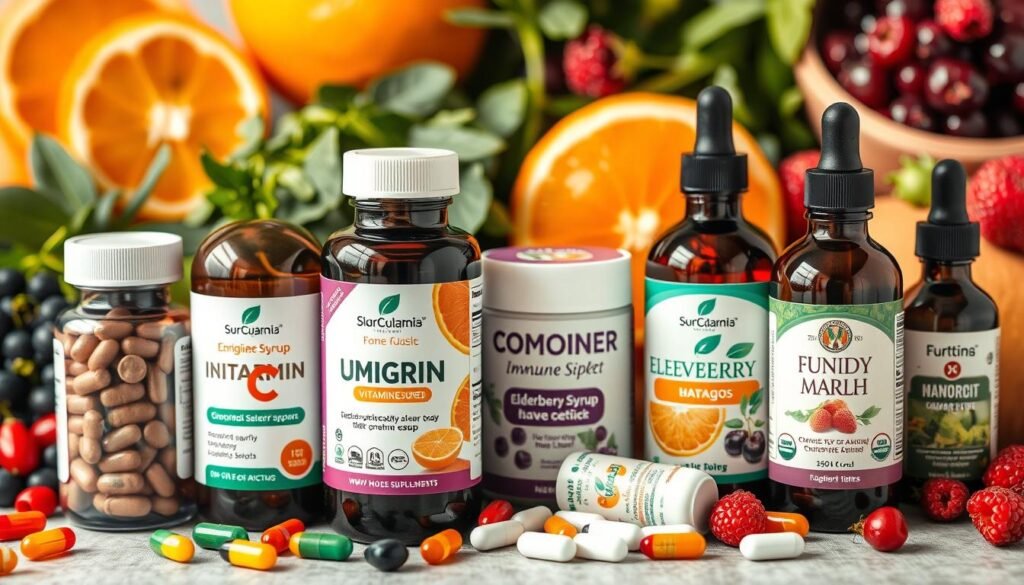
Immune Support Vitamins: Everything You Need to Know
Immune support vitamins are key to keeping us healthy. They help our bodies fight off sickness. Knowing how much to take is important, with amounts varying by age.
For example, infants, kids, and teens need 300 to 1,200 microgram retinol activity equivalents of vitamin A1. Adults need 700 to 1,300 mcg RAE1. Vitamins C and D, along with minerals like zinc, are vital for a strong immune system.
Some vitamins, like Immune MAX® Fizzy Wellblends™, get great reviews. It has a 4.30 out of 5 rating from 106 reviews2. Others, like Vitamin C Zero Sugar‡, also get high praise, with a 4.35 out of 5 rating from 86 reviews2. Knowing the benefits and safe amounts is key to choosing the right vitamins.
Key Takeaways
- Immune support vitamins, such as vitamins C and D, play a vital role in our health and immune system.
- The daily vitamin needs change with age, from 300 to 1,200 microgram retinol activity equivalents for young people1.
- Products like Immune MAX® Fizzy Wellblends™ have high ratings, with 4.30 out of 5 from 106 reviews2.
- It’s important to know the benefits and safe amounts of immune support vitamins for our health.
- Choosing the right vitamins for our immune system depends on age, health, and nutritional needs.
- Immune support vitamins can lower the risk of getting sick and improve our overall health.
What Are Immune Support Vitamins?
Immune support vitamins are key for a strong immune system. They include immune boosting supplements and top immunity vitamins. These help fight off infections and diseases. A lack of vitamin D can lead to serious health issues like osteoporosis and cancer3.
Eating foods rich in immune boosting supplements and top immunity vitamins is vital. Vitamins C, D, and zinc are important for a healthy immune system. Vitamin C helps fight off sickness, and vitamin E is great for immune health4.
When picking immune boosting supplements and top immunity vitamins, look at the product’s quality. Some products, like those rated by2, are highly rated by customers. They might be a good choice for boosting your immune system.
| Vitamin/Mineral | Food Sources | Benefits |
|---|---|---|
| Vitamin C | Citrus fruits, strawberries, bell peppers | Boosts immune function, fights off infections |
| Vitamin D | Fatty fish, fortified dairy products, sunlight | Supports bone health, immune function |
| Zinc | Oysters, beef, chicken, fortified cereals | Supports immune function, wound healing |
Types of Immune Support Vitamins
Many vitamins and minerals are key for natural immune support. Supplements can help fill nutritional gaps, boosting overall health. For example, visiting a health and wellness store offers a variety of products. These include vitamin C, vitamin D, and zinc, all important for immune function.
Vitamin C is famous for its antioxidant benefits. Vitamin D is vital for immune cell work5. Zinc, a mineral, is also key for immune response3. Too much zinc can affect copper and iron levels3. Elderberry supplements are another way to support the immune system3.
Choosing the right supplements is important. Look at daily needs and possible interactions. Vitamin C’s safe limit is 2,000 mg3. Daily doses usually range from 250 to 1,000 mg3. Knowing about these vitamins helps make smart choices for natural immune support.
https://www.youtube.com/watch?v=-WdTAk9QMGI
Benefits of Immune Support Vitamins
Immune support vitamins are key to a healthy immune system. Vitamins like vitamin C and D boost the immune system. This reduces the risk of getting sick and improves overall health6. A strong immune system fights off diseases and infections well.
Key benefits include lowering the risk of illness and improving health7. These vitamins also help lessen the severity of illnesses and aid in recovery. For instance, vitamin D is good for bones and helps the immune system work right6.
Choosing the right vitamins is important, as too much can be harmful. Eating foods rich in vitamins and minerals helps the immune system. But, for those lacking nutrients, immune system boosters can be helpful. People like vegetarians, vegans, and seniors might need a daily multivitamin7.
How to Choose the Right Immune Support Vitamins
Choosing the right immune support vitamins is key. You need to think about your nutritional needs and pick high-quality options. Vitamins A, C, and D are important for a strong immune system. Not having enough can make you more likely to get sick.
When picking vitamins, read the labels well. Look for clear information on what’s inside and how it’s made. It’s also important to choose brands known for quality and following good manufacturing practices (GMPs). Taking the right amount of vitamins, like 1000 mg of Vitamin C twice a day, can help your immune system.
- Understand your nutritional needs and identify any deficiencies.
- Read labels carefully to ensure transparency and accuracy.
- Choose trusted brands that follow GMPs and have a reputation for quality.
By following these tips, you can find the best immune support vitamins for you. Always talk to a healthcare professional before starting any new supplements. This is true if you have health issues or take medicines.

When to Consider Immune Support Vitamins
Immune support vitamins are key for a strong immune system, more so in certain times or under stress. The right vitamins can boost your immune system and ward off illnesses. Taking immune boosting supplements is wise during seasonal changes, when infections are more common8.
Studies show some nutrients are vital for a healthy immune system. Not having enough can weaken it9. Vitamin C, for instance, is important for immune cells, and lacking it can harm immune function10. Eating foods rich in these nutrients can support your immune health.
Top vitamins for immune support include vitamin C, D, and zinc. You can find them in fruits, veggies, and whole grains. But, when stressed or sick, supplements can give your immune system an extra edge8.
| Nutrient | Food Sources | Recommended Daily Intake |
|---|---|---|
| Vitamin C | Citrus fruits, strawberries, bell peppers | 90 mg (men), 75 mg (women)10 |
| Vitamin D | Fatty fish, fortified dairy products, sunlight | 600-800 IU (adults)10 |
| Zinc | Oysters, beef, chicken, fortified cereals | 11 mg (men), 8 mg (women)8 |
In summary, immune support vitamins are good for a healthy immune system, more so in stressful times or when sick9. Always talk to a healthcare professional before starting supplements to make sure they’re right for you8.
Safe Dosages for Immune Support Vitamins
When looking at natural immune support, knowing the safe doses is key. It’s important to stick to the recommended amounts to avoid too much. For example, 400-800 IU, or 10-20 mcg, of vitamin D daily is good for most people in the U.S11..
It’s vital not to take too much, as it can cause problems. Taking more than 4,000 IU a day can lead to issues like nausea and heart problems12.
Recommended Daily Allowances
Knowing the daily needs is essential for using top immunity vitamins right. The daily vitamin D amount is 400 IU for kids up to 12 months, 600 IU for ages 1 to 70, and 800 IU for those over 7012. Also, about 41% of Americans lack enough vitamin D, with more issues in women and Black people11.
Signs of Overconsumption
It’s important to know when you’ve had too much. Levels below 30 ng/mL are seen as a deficiency by some11. But, taking too much vitamin D is rare, needing doses over 50,000 IU11.
Consulting with Healthcare Professionals
Getting advice from doctors is a good idea. They can tailor advice to your health needs, making sure you use natural immune support vitamins safely.

By following these tips and getting doctor advice, you can use top immunity vitamins safely. This helps your immune system without the risks of too much or bad effects.
Dietary Sources of Immune Support Vitamins
Many foods offer vitamins that boost your immune system. Citrus fruits, like oranges and grapefruits, are packed with vitamin C, which is key for fighting off infections13. Broccoli and other veggies are also great sources of vitamin C14.
Fish like salmon and tuna are full of vitamin D, which is vital for a strong immune system14. Oysters, crab, and lobster are also good for you, with lots of zinc. Adults need about 11 mg of zinc every day13.
Nuts, seeds, and spinach are rich in vitamin E, another important nutrient14. Drinking green tea can also help your immune system, thanks to its antioxidants14. Eating these foods can help keep your immune system strong, reducing the need for supplements.
These foods are full of vitamins and minerals that support your immune system1314.
The Importance of a Balanced Diet
A balanced diet is key for a strong immune system. It’s important to eat whole foods, not just vitamins. Research shows that good nutrition helps immune cells fight off infections15.
Foods like fruits, vegetables, and whole grains give us important nutrients. These include vitamins and minerals that boost our immune system. For example, vitamin C and zinc are found in citrus fruits, bell peppers, and shellfish16.
Eating well also helps our gut bacteria grow, which is vital for our immune system. A healthy gut keeps our immune system in check and fights off infections17. Foods like oatmeal and asparagus support good gut bacteria. Also, vitamin D and selenium are in fatty fish and brazil nuts16.
Here are some foods that are great for immune health:
- Citrus fruits, such as oranges and grapefruits, which are rich in vitamin C
- Leafy greens, such as spinach and kale, which are rich in vitamin A and iron
- Fatty fish, such as salmon and tuna, which are rich in vitamin D and selenium
- Nuts and seeds, such as sunflower seeds and pumpkin seeds, which are rich in vitamin E and zinc

Eating these foods can help keep your immune system strong. It can also lower your chance of getting sick. Always talk to a healthcare professional before changing your diet or adding supplements15.
| Foods | Immune System Boosters |
|---|---|
| Citrus fruits | Vitamin C |
| Leafy greens | Vitamin A and iron |
| Fatty fish | Vitamin D and selenium |
| Nuts and seeds | Vitamin E and zinc |
Myths About Immune Support Vitamins
There are many myths and misconceptions about immune support vitamins. It’s important to know the truth to make good health choices. One myth is that taking lots of vitamins can make our immune system stronger18. But, studies show that taking huge amounts of vitamins doesn’t really help our immune system19.
Some common myths about immune support vitamins include:
- Taking vitamins can replace a healthy diet
- All supplements are created equal
- Immune support vitamins can cure illnesses
It’s key to remember that immune support vitamins should add to a healthy lifestyle, not take its place. Knowing these myths helps us make better health choices.
Recent studies show that the COVID-19 pandemic has taken about 5 million lives so far19. This shows how vital immune support is. Experts say that getting vaccinated boosts our immunity19. They also recommend sleeping 7-8 hours a night to help our immune system1819. By knowing the truth and making smart choices, we can improve our immune health and overall well-being.
The Role of Supplements vs. Whole Foods
The debate on whether supplements or whole foods are better for immune health is ongoing. Immune boosting supplements can be helpful, but knowing when to use them is key. A 2019 survey found that 82% of people take at least one supplement every day20.
Experts recommend a whole-foods, plant-based diet as the best way to stay healthy20. This diet gives you the nutrients you need, including top immunity vitamins. It also helps lower the risk of chronic diseases. Yet, sometimes supplements are needed, like for people with certain health issues or dietary needs.
Here are some times when supplements might be needed:
- Pregnant women need prenatal vitamins for extra nutrients20
- People with Crohn’s or celiac disease might not absorb nutrients well from food20
- Those with food allergies or dietary restrictions might need supplements for their nutrition20

In summary, while immune boosting supplements are useful, it’s important to know their place next to whole foods. Making smart choices about supplements and diet can help keep your immune system strong and your overall health good.
How Lifestyle Influences Immune Function
Our lifestyle greatly affects our immune function. Making smart choices can help us naturally support our immune system. For example, regular exercise boosts our immune system. Studies show adults who exercise weekly are 50% less likely to die from flu and pneumonia than those who don’t21.
Not exercising is a big risk for death worldwide. But, regular exercise lowers the risk of getting sick by 31%22.
Getting enough sleep is also key for a strong immune system. Sleep loss can harm our immune system21. Stress management, like meditation or yoga, also helps our immune function. A diet full of nutrients is essential, making immune health supplements a good addition to our daily routine.
Here are some lifestyle changes to boost your immune function:
* Regular physical activity, like walking or jogging
* Stress-reducing techniques, like meditation or deep breathing
* Aim for 7-9 hours of sleep each night
* Eat a balanced diet with fruits, vegetables, and whole grains, and consider natural immune support options
To learn more about boosting your immune system, visit this resource. It highlights the role of gut health in supporting our immune system. By choosing a healthy lifestyle and using immune health supplements, we can actively support our immune function and overall health22.
Recent Research on Immune Support Vitamins
Recent studies show how important vitamins are for our immune system. They help prevent illnesses. A diet full of vitamins like C, D, zinc, and iron helps our immune cells work better23. Some people might need supplements to avoid deficiencies and keep their immune system strong24.
Vitamin D is key for our immune system. People with low vitamin D levels are more likely to get sick with SARS-CoV-2 and need hospital care25. Vitamin C can also cut down the time we’re sick with a cold by half a day. It helps with symptoms like chest pain and fever24.
Studies Highlighting Vitamin E
Vitamin E is also vital for our immune system. More research is needed, but it seems to help our immune system and lower illness risk23.
In summary, recent studies emphasize the need for a balanced diet and supplements for a strong immune system. Adding vitamins like C, D, and E to our diet can lower illness risk and boost overall health25.
Integrating Immune Support Vitamins into Your Routine
To keep your immune system strong, add immune defense vitamins and immune support vitamins to your daily life. About 70% of your immune system is in your gut. This shows how important a healthy gut is for your immune health26. Eating foods high in Vitamin C, like oranges and strawberries, can also boost your immune function27.
Regular exercise, enough sleep, and a healthy diet are all good for your immune system. Adults should sleep 7-9 hours each night to fight off sickness28. Also, eating foods that boost your immune system, like fatty fish and leafy greens, can help keep your body strong.
Here are some tips for adding immune support vitamins to your routine:
- Take Vitamin D supplements in winter when levels are lower26
- Eat foods high in Zinc, like beef and chicken, for immune support27
- Add probiotics to your diet to keep your gut healthy and boost your immune system27
By following these tips and adding immune support vitamins to your daily routine, you can keep your immune system healthy. This can help you avoid getting sick. Always talk to a healthcare professional before starting new supplements or changing your diet26.
Vegan and Plant-Based Immune Support Options
Following a vegan or plant-based diet can make it hard to find the right vitamins for immune support. But, there are many cruelty-free options that offer key nutrients for a strong immune system29. Supplements like Olive Your Heart® and Mushroom Immune are good choices, priced from $19.95 to $85.00.
Choosing trusted brands is key when you have dietary restrictions. Look for brands that offer vegan and plant-based options. They have products like Vitamin D3 and Omega-3, which are vital for immune health. Here are some options:
- Plant-Based Super Daily® D3, priced at $21.0029
- Baby’s Plant-Based Super Daily® D3, priced at $15.9029
- Vitamins A • D3 • K2 supplement, priced between $24.90 and $44.9029
Always talk to a healthcare professional before trying new supplements, even if you’re vegan or plant-based. The right supplements can boost your immune system and improve your health.
FAQs About Immune Support Vitamins
Many people wonder what vitamins are best for their immune health. The key is a mix of diet and supplements. Foods like fruits, veggies, and whole grains are great because they have vitamins, minerals, and fiber30.
Vitamins like C, D, and Zinc are top choices for boosting immunity. You can find them in food or take them as supplements. But, always talk to a doctor before starting any supplements, even if you’re healthy30.
The National Center for Complementary and Integrative Health (NCCIH) warns about COVID-19 remedies. They say there’s no proof that herbal therapies, teas, or essential oils can fight COVID-1930.
For more info on supplements, check out the Office of Dietary Supplements website. The FDA doesn’t need studies to approve supplements31. Choose reliable brands and stick to the daily amounts to avoid side effects. Vitamin C’s daily needs vary by age, from 15 to 115 mg for kids and teens, and 75 to 120 mg for adults1.
Focus on natural ways to boost your immune system. A balanced diet and a healthy lifestyle are key. By making smart choices, you can keep your immune system strong and fight off illnesses.
Conclusion: Embracing Immune Support for Wellness
As we wrap up our look at immune support vitamins, it’s clear they’re key for our health32. They help boost our immune system, lower infection risk, and fight off illness. Adding these vitamins to our daily lives can greatly improve our health.
Recap of Key Takeaways
In this article, we learned about vitamins C, D, and zinc’s power33. We also saw how important a diet full of antioxidants and immune boosters is. We cleared up myths and talked about the best ways to keep our immune system strong.
Encouraging Healthy Habits
Now, let’s focus on a whole-body approach to immune support32. Eating well, exercising, and managing stress are all important. Adding immune support vitamins to your routine can make your body stronger and improve your wellness. Every small step towards a healthier life can help a lot in the long run.
FAQ
What are the best vitamins for immunity?
Can I get enough nutrients from food, or do I need supplements?
Are there any side effects to taking immune support vitamins?
Source Links
- Office of Dietary Supplements – Dietary Supplements for Immune Function and Infectious Diseases
- Immune Support Vitamins & Supplements
- Can Supplements Fight Coronavirus (COVID-19)? 15 Immune Boosters
- 5 Vitamins To Keep Your Immune System Strong
- Office of Dietary Supplements – Dietary Supplements for Immune Function and Infectious Diseases
- Immune System Vitamins & Tablets | Immunity | Vitabiotics®
- Do multivitamins help build the immune system? – Blog | Everlywell: Home Health Testing Made Easy
- Can I Boost My Immune System? | Mount Sinai Today
- On the Shelf: Immune Support
- Immune System: Boost or balance?
- What Vitamin D Dosage Is Best?
- Vitamin D
- What to Eat and Drink to Boost Your Immune System
- Boost Immunity with Food
- Diet and Immune Function – PMC
- Nutrition and Your Immune System – Lompoc Valley Medical Center
- The relationship between nutrition and the immune system
- Myths vs. Facts About Boosting Your Immune Sytem
- Mythbusting: Boosting Your Immune System
- 5 Benefits of Getting Your Nutrients From Whole Foods vs Supplements
- Healthy Habits: Enhancing Immunity
- Physical Activity and Nutritional Influence on Immune Function: An Important Strategy to Improve Immunity and Health Status
- Nutrition and Immunity
- Supplements for immunity: Benefits and limits
- Multi-Level Immune Support by Vitamins C and D during the SARS-CoV-2 Pandemic
- Best Vitamins and Supplements to Boost Your Immune Support
- Eight Nutrients to Support Your Immune System
- 5 Natural Ways to Boost Your Immune System
- Immune System Boosters: Supplements for Immune Support
- What To Know About ‘Immune Boosting’ Supplements
- Office of Dietary Supplements – Frequently Asked Questions (FAQ)
- Embracing cancer immunotherapy with vital micronutrients
- The Role of Nutrition in Boosting Your Immune System – Eastside Ideal Health






